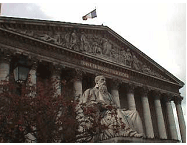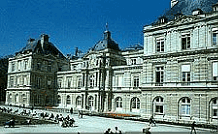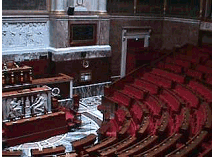POLITICAL ENVIRONNEMENT
THE NATIONAL ASSEMBLY

Source:
www.parisbalades.com
Directly elected every five years by universal suffrage, it holds – along with the Senate – the legislative power which forms the basis of the parliamentary regime in France. At different periods it has been composed of 400 to over 600 deputies. It was at the height of its power in the 3rd and 4th Republics (when it was called the Chamber of Deputies), which were really Assembly regimes. Since 1958, it has been the main organ of legislative power and retains an essential role in voting on laws and budgets.
The Constitution of the 5th Republic, put
in place by General de Gaulle in 1958, considerably reduced the
powers of the National Assembly in favour of executive power (the
president and the government). He did so by introducing jurisdictional
processes that deprived the Assembly of certain prerogatives and
limited its ability to topple the government.
The President of
the Republic can also dissolve the Assembly with relative ease
(used in 1962, 1968, 1981, 1988…). The power balance is
safeguarded by an obligation on the president to choose his prime
minister from whichever party or coalition holds the majority
in the Assembly, and by the ballot method (which consists of each
member voting in a preliminary ballot, then again in a decisive
ballot),which gives the possibility of unblocking stable majorities.
Despite this clear imbalance in favour of the executive, the French
system remains parliamentary, as was demonstrated by the two instances
where the president and the prime minister came from opposing
parties (1986-1988 and 1993-1995), the president can not ignore
the make-up of the assembly and must appoint a prime minister
from the majority.
 Source:
Source:
www.parisbalades.com
The second house of parliament, the Senate, represents territorial
communities and French citizens abroad.
In unitary nations like France, the institution of a second parliamentary
assembly responds either to the need for representation of the
aristocracy (the Chamber of Peers was created by the charter of
1814) or to split legislative power in order to weaken it (the
Council of Elders of the Constitution of the year III). In 1875,
the establishment of the Senate provided a guarantee to the Moderates
by providing them with the possibility of reaching compromise
with the Republicans.
The 5th Republic established a diminished two-chamber system.
The Senate plays only a secondary role in the development of
legislation (when the two chambers fail to come to agreement,
the Assembly has the final word) and can not bring governmental
powers into play. However, despite the limits of its institutional
powers, the Senate does exert a certain political influence.
The age of its members (minimum of 35 years), the duration of
their mandate (nine years) and their mode of nomination (an
electoral body composed of locally elected officials) all combine
to give the Senate its role as an organ of reflection and moderation.
Furthermore, the Senate
shares powers with the Assembly for revisions of the Constitution
and so assures the durability of the system of government. The
institutional prestige that the higher chamber enjoys is demonstrated
by the fact that the President of the Senate can temporarily
stand in for the President of the Republic when necessary.
THE PARLIAMENTARY REGIME

A form of political organisation based on the principles of collaboration and mutual control of executive and legislative powers. Parliamentary regimes are formed on the concept of the separation of powers; since the institutional separation of powers, which is a fundamental element of democracy, is tempered by their political and functional interdependence. The political responsibility of government to parliament, the centrepiece of the parliamentary system, is counterbalanced by the executive’s right to dissolve the legislative chamber (mutual revocability). Organisation politique fondĂ©e sur la collaboration et le contrĂ´le mutuel des pouvoirs exĂ©cutif et lĂ©gislatif.
Elsewhere, powers are interwoven between the two chambers: the government participates in the drawing up of legislation, while the parliament can check the actions of the executive, particularly in budgetary matters.
The rules regarding the functioning of the parliamentary regime
have been empirically developed over time. Having first appeared
in the United Kingdom in the 18th century, they were brought to
France in the 19th century, then adjusted and refined over the
course of time. Having undergone delicate modifications, the parliamentary
system that exists can take multiple forms, which vary according
to the nature and the relative weight of the executive power.
- Paris-city Partners :
- Music News
- Rock, Jazz & Blues CDs
- Learn French in Paris
- Learn French in France
- Paris Junior Programs
- Learn English in England
- Business English Courses
- Need a translation?
- For teachers of French
- French Exercise & Tests
- Directories
- English courses for Teens in UK
- Camps for Teens in England
- Language Courses Abroad
- English courses in England
- Learn a Language Abroad


